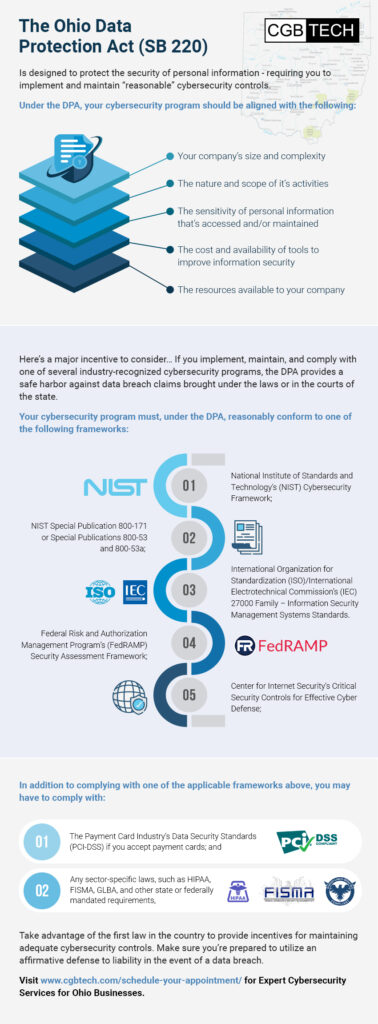Small businesses, in particular, face increasing pressure to safeguard their digital assets and sensitive information to meet regulatory obligations such as the Sarbanes-Oxley Act (SOX), Financial Industry Regulatory Authority (FINRA) regulations, and Health Insurance Portability and Accountability Act (HIPAA) requirements.
In this comprehensive Cybersecurity Services for Ohio Businesses Guide, we’ll explore the fundamental principles of cybersecurity and how they intersect with compliance obligations, providing actionable insights and strategies for small businesses to enhance their security posture and meet regulatory requirements effectively.
Laws and Regulations Businesses Must Consider When Selecting Cybersecurity Services for Ohio Businesses
What do Ohio businesses need to know about cybersecurity? Well, Ohio has legislation that businesses need to follow, in addition to any national compliance laws. There’s a plus side though: if you follow this legislation, you’re able to utilize an affirmative defense to liability in the event of a data breach.
Let’s take a look at the legislation…

Evaluating Cybersecurity Services for Ohio Businesses: What Your Provider Should Be Handling for You
Basic Cybersecurity Measures That Should Be Included in Any Cybersecurity Services for Ohio Businesses
While the cyber threat landscape continues to evolve, implementing basic cybersecurity measures can significantly enhance your organization’s security posture and resilience against cyber attacks. When you’re evaluating Cybersecurity Services for Ohio Businesses, there’s a few fundamental practices that are necessary to mitigate risks and protect your assets:
Risk Assessment and Management: Conduct regular risk assessments to identify, prioritize, and mitigate potential security risks and vulnerabilities. Implement risk management processes and controls to address identified threats and minimize their impact on the organization.
Security Policies and Procedures: Develop comprehensive security policies, procedures, and guidelines to define roles, responsibilities, and best practices for ensuring the security of information assets. Establish clear protocols for incident response, data protection, access control, and employee training.
Employee Training and Awareness: Provide ongoing security awareness training and education to employees to raise awareness of cyber threats, promote responsible security practices, and empower them to recognize and report suspicious activities or phishing attempts.
Secure Network Architecture: Design and implement secure network architectures with segmentation, firewalls, intrusion detection and prevention systems (IDS/IPS), and network access controls to protect against unauthorized access, malware infections, and lateral movement by attackers.
Endpoint Security: Secure endpoints such as desktops, laptops, mobile devices, and servers with antivirus software, endpoint detection and response (EDR) solutions, encryption, and application whitelisting to detect and prevent malware infections, data breaches, and unauthorized access.
Data Protection and Encryption: Encrypt sensitive data both at rest and in transit using strong encryption algorithms and encryption keys. Implement data loss prevention (DLP) solutions, access controls, and data classification policies to protect confidential information and prevent unauthorized disclosure.
Incident Detection and Response: Deploy security monitoring tools, intrusion detection systems (IDS), and security information and event management (SIEM) solutions to detect suspicious activities, anomalies, and security incidents in real time. Establish incident response plans, procedures, and escalation protocols to respond promptly to security incidents, contain breaches, and minimize their impact.
The ideal Cybersecurity Services for Ohio Businesses will incorporate all of the measures listed above to keep your business safe against potential threats.
Advanced Cybersecurity Measures That Should Be Included in Any Cybersecurity Services for Ohio Businesses
While implementing basic cybersecurity measures is essential for small businesses to meet compliance requirements and protect against common cyber threats, advanced cybersecurity measures can further enhance security posture and resilience. Advanced cybersecurity measures leverage cutting-edge technologies, proactive strategies, and specialized expertise to detect, prevent, and mitigate sophisticated cyber threats.
Any provider of Cybersecurity Services for Ohio Businesses must be prepared to help you strengthen your defenses through the following advanced cybersecurity measures:
1. Threat Intelligence: Utilize threat intelligence feeds, platforms, and services to gather actionable insights into emerging cyber threats, attacker tactics, and indicators of compromise (IOCs). Threat intelligence enables organizations to proactively identify and respond to potential security incidents, enhance threat detection capabilities, and stay ahead of cyber adversaries.
2. Security Orchestration and Automation: Implement security orchestration, automation, and response (SOAR) solutions to streamline incident response processes, automate repetitive tasks, and orchestrate security workflows. SOAR platforms enable organizations to improve incident response times, reduce manual intervention, and maximize the efficiency of security operations teams.
3. Endpoint Detection and Response (EDR): Deploy advanced endpoint detection and response (EDR) solutions to monitor and protect endpoints such as desktops, laptops, and servers against advanced threats. EDR platforms leverage behavioral analytics, machine learning, and threat intelligence to detect suspicious activities, identify malicious behavior, and respond to security incidents in real time.
4. Deception Technology: Utilize deception technology to deceive and divert attackers away from critical assets and infrastructure. Deception solutions deploy decoy systems, files, and credentials across the network to lure attackers into revealing their presence, tactics, and objectives. Deception technology enhances threat detection capabilities and enables organizations to proactively defend against targeted attacks.
5. Zero Trust Architecture: Adopt a zero trust security model to enforce strict access controls, least privilege principles, and continuous authentication throughout the network. Zero trust architecture assumes that all users, devices, and applications are untrusted and verifies identity and authorization for every access request, regardless of the network location. Zero trust principles help mitigate the risk of insider threats, lateral movement by attackers, and unauthorized access to sensitive data.
6. Cloud Security Posture Management (CSPM): Implement cloud security posture management (CSPM) solutions to ensure the security and compliance of cloud environments. CSPM platforms assess cloud infrastructure configurations, monitor for misconfigurations and security risks, and provide recommendations to remediate vulnerabilities and maintain compliance with regulatory standards.
7. Incident Response Preparedness: Develop and test incident response plans, playbooks, and tabletop exercises to prepare for and respond to security incidents effectively. Incident response preparedness involves defining roles and responsibilities, establishing communication channels, and rehearsing response procedures to minimize the impact of security breaches and ensure a coordinated and timely response.
By leveraging the best possible Cybersecurity Services for Ohio Businesses, small businesses can enhance their security posture, detect and respond to sophisticated threats, and ensure compliance with regulatory requirements. However, it’s essential to assess the organization’s specific needs, risks, and capabilities before implementing advanced cybersecurity measures and to prioritize investments based on the most significant security challenges and compliance obligations.
Our IT security solutions are designed to fit your unique environment – taking into consideration what’s required for your specific needs rather than implementing a one-size-fits-all solution. Ohio businesses have trusted our cybersecurity services for over 20 years – and for good reason. We’re the top provider of Cybersecurity Services for Ohio Businesses.
Basic Types of Cyber Threats Your Cybersecurity Services for Ohio Businesses Should Protect Against
Malware: Malicious software designed to infiltrate systems, compromise data, or disrupt operations. Common types of malware include viruses, worms, Trojans, ransomware, and spyware.
Phishing: Social engineering attacks that use deceptive emails, messages, or websites to trick users into revealing sensitive information, such as login credentials, financial details, or personal information.
Data Breaches: Unauthorized access to sensitive information, resulting in the theft, disclosure, or compromise of confidential data. Data breaches can have severe consequences for businesses, including financial losses, reputational damage, and legal liabilities.
Denial of Service (DoS) Attacks: Overwhelming a system, network, or service with a flood of traffic or requests to disrupt its normal operation and deny access to legitimate users. Distributed Denial of Service (DDoS) attacks involve multiple compromised devices coordinated to attack a target, making them challenging to mitigate.
Insider Threats: Security risks posed by employees, contractors, or business partners who misuse their privileges, access sensitive information without authorization, or intentionally sabotage systems or data.
Any Provider Offering Cybersecurity Services for Ohio Businesses MUST Know About These Emerging Trends in Cybercrime
In recent years, the threat landscape of cybercrime has undergone significant evolution, with cybercriminals employing increasingly sophisticated tactics and techniques to target businesses and individuals. From large-scale data breaches to sophisticated ransomware attacks, cybercrime poses a significant threat to organizations of all sizes, including small businesses.
Cybercrime is a dynamic and rapidly evolving phenomenon, driven by advances in technology, changes in criminal tactics, and the growing interconnectedness of digital systems. Any provider offering Cybersecurity Services for Ohio Businesses must know about these emerging trends in cybercrime:
1. Ransomware-as-a-Service (RaaS): Ransomware has emerged as one of the most lucrative forms of cybercrime, with cybercriminals using ransomware-as-a-service models to distribute ransomware to a wide range of targets. RaaS allows even novice cybercriminals to launch ransomware attacks with minimal technical expertise, increasing the prevalence of ransomware incidents worldwide.
2. Supply Chain Attacks: Cybercriminals are increasingly targeting supply chains to compromise multiple organizations through a single attack. Supply chain attacks involve infiltrating trusted vendors or partners to gain access to their networks and leverage this access to launch attacks on primary targets, resulting in widespread damage and disruption.
3. Business Email Compromise (BEC): BEC attacks involve impersonating company executives or suppliers to trick employees into transferring funds or disclosing sensitive information. These attacks often exploit social engineering tactics and spoofed email domains to deceive victims, resulting in financial losses and reputational damage for businesses.
4. IoT Exploitation: The proliferation of Internet of Things (IoT) devices has expanded the attack surface for cybercriminals, allowing them to target vulnerable devices such as smart home appliances, connected medical devices, and industrial control systems. IoT exploitation can lead to data breaches, service disruptions, and even physical harm in critical infrastructure sectors. If you don’t feel certain you’re working with a provider that offers top tier Cybersecurity Services for Ohio Businesses, get in touch with us to get a second opinion.
What Happens If You Don’t Choose the Right Cybersecurity Services for Ohio Businesses?
The impact of modern cybercrime extends far beyond financial losses and operational disruptions, affecting businesses, governments, and individuals on a global scale. If you don’t choose the right Cybersecurity Services for Ohio Businesses, some of the key impacts of cybercrime include:
1. Financial Losses: Cybercrime costs businesses billions of dollars each year in direct financial losses, including ransom payments, regulatory fines, legal fees, and remediation costs. Small businesses, in particular, may struggle to recover from the financial impact of cyber attacks, leading to closures or bankruptcy.
2. Reputational Damage: Cybersecurity incidents can tarnish the reputation and credibility of businesses, eroding customer trust and loyalty. Data breaches, in particular, can have long-lasting reputational consequences, resulting in loss of customers, partners, and investors.
3. Regulatory Compliance: Regulatory requirements such as SOX, FINRA, and HIPAA mandate stringent cybersecurity measures to protect sensitive data and ensure the privacy and security of customer information. Non-compliance with these regulations can lead to severe penalties, sanctions, and legal consequences for businesses.
4. National Security: Cybercrime poses a significant threat to national security, with state-sponsored cyber attacks targeting critical infrastructure, government agencies, and defense contractors. These attacks can disrupt essential services, compromise classified information, and undermine national security interests.
Choosing the right Cybersecurity Services for Ohio Businesses helps you rest assured knowing you’re safeguarded against the devastating impact of cybercrime.
Gain a Safe Harbor Against Data Breach Claims Under Ohio’s Data Protection Act – Practical Strategies for Compliance from the Top Cybersecurity Services Provider in Ohio
Our Cybersecurity Services for Ohio Businesses help you achieve compliance with various regulatory standards. Here’s a look at some practical strategies we utilize to help small businesses ensure compliance through cybersecurity:
1. Conduct a Compliance Assessment: Start by conducting a comprehensive assessment of your organization’s compliance requirements, including regulatory standards such as SOX, FINRA, HIPAA, GDPR, and industry-specific mandates. Identify applicable regulations, understand the specific requirements, and assess your current cybersecurity posture to identify gaps and areas for improvement.
2. Develop a Compliance Framework: Develop a compliance framework or roadmap that outlines the steps, processes, and controls necessary to achieve and maintain compliance with regulatory requirements. Define roles and responsibilities, establish governance structures, and prioritize compliance initiatives based on the organization’s risk profile and compliance obligations.
3. Implement Security Controls: Implement a robust set of cybersecurity controls and best practices to address regulatory requirements and mitigate security risks. Deploy firewalls, intrusion detection systems, antivirus software, encryption technologies, and access controls to protect sensitive data, prevent unauthorized access, and ensure data privacy and security.
4. Establish Data Governance Policies: Develop and enforce data governance policies and procedures to manage the collection, storage, processing, and sharing of sensitive data in compliance with regulatory requirements. Implement data classification, retention, and disposal policies, establish data access controls, and monitor data usage to prevent unauthorized disclosures and breaches.
5. Conduct Regular Audits and Assessments: Conduct regular audits, assessments, and compliance reviews to evaluate the effectiveness of cybersecurity controls and ensure ongoing compliance with regulatory standards. Perform internal and external audits, vulnerability assessments, and penetration tests to identify vulnerabilities, assess risks, and validate compliance with regulatory requirements.
6. Provide Security Awareness Training: Educate employees about cybersecurity risks, compliance obligations, and best practices through security awareness training programs. Train employees on how to recognize phishing attempts, safeguard sensitive information, and report security incidents promptly. Foster a culture of security awareness and accountability throughout the organization.
7. Establish Incident Response Procedures: Develop and document incident response procedures, protocols, and escalation paths to respond effectively to security incidents and breaches. Define roles and responsibilities, establish communication channels, and conduct tabletop exercises to simulate and test incident response plans. Implement incident detection and response technologies to detect, contain, and mitigate security incidents in real time.
8. Engage with External Partners: Collaborate with external partners, vendors, and industry associations to stay informed about emerging threats, best practices, and regulatory developments. Participate in information sharing forums, collaborate with industry peers, and leverage external resources such as threat intelligence feeds, security assessments, and compliance certifications to enhance cybersecurity and compliance efforts.
As a leading provider of Cybersecurity Services for Ohio Businesses, we’re here to offer the practical strategies listed above. Just get in touch with us to get started.
Why You Need an Expert Provider to Safeguard You with Cybersecurity Services for Ohio Businesses
At its core, cybersecurity encompasses a broad range of practices, technologies, and processes designed to safeguard computer systems, networks, and data from unauthorized access, breaches, or damage. It involves proactively identifying and mitigating security risks, implementing protective measures, and maintaining the confidentiality, integrity, and availability of information assets.
When you’re looking for Cybersecurity Services Ohio businesses can trust, you need to select an expert provider that understands the foundational principles of Cybersecurity Services for Ohio Businesses:
Confidentiality: Ensuring that sensitive information is accessible only to authorized individuals or entities and protected against unauthorized disclosure or access. Confidentiality is typically achieved through encryption, access controls, and data classification.
Integrity: Preserving the accuracy, consistency, and trustworthiness of data throughout its lifecycle. Measures such as data validation, checksums, and digital signatures help detect and prevent unauthorized alterations or tampering of data.
Availability: Ensuring that information and resources are accessible and usable when needed, without disruption or downtime. Availability is achieved through redundancy, fault tolerance, and robust disaster recovery plans.
Authentication: Verifying the identity of users or entities accessing systems or data resources. Authentication mechanisms include passwords, biometrics, smart cards, and multi-factor authentication (MFA) to enhance security.
Authorization: Granting appropriate privileges and permissions to authenticated users based on their roles, responsibilities, and access requirements. Access controls, role-based access control (RBAC), and least privilege principles help enforce authorization policies.
Cybersecurity Services for Ohio Businesses Are Essential to Take Advantage of Incentives Offered Through Ohio’s Data Protection Act
Cybersecurity plays a vital role in ensuring compliance with regulatory standards and industry requirements for small businesses. Ohio businesses are able to take advantage of incentives offered through Ohio’s Data Protection Act – as long as they’re working with a top cybersecurity solutions provider. Not all Cybersecurity Services for Ohio Businesses are the same. It’s essential to look for an organization that has extensive experience in the field of cybersecurity.
Although our team provides Cybersecurity Services for Ohio Businesses, we’re also able to assist with any technology requirements to keep your business running smoothly. From 24/7 monitoring to vendor management – we’re here to help with reliable IT support for businesses in Cleveland and throughout Ohio.






 – John McMicken
– John McMicken – Adam Stalder
– Adam Stalder